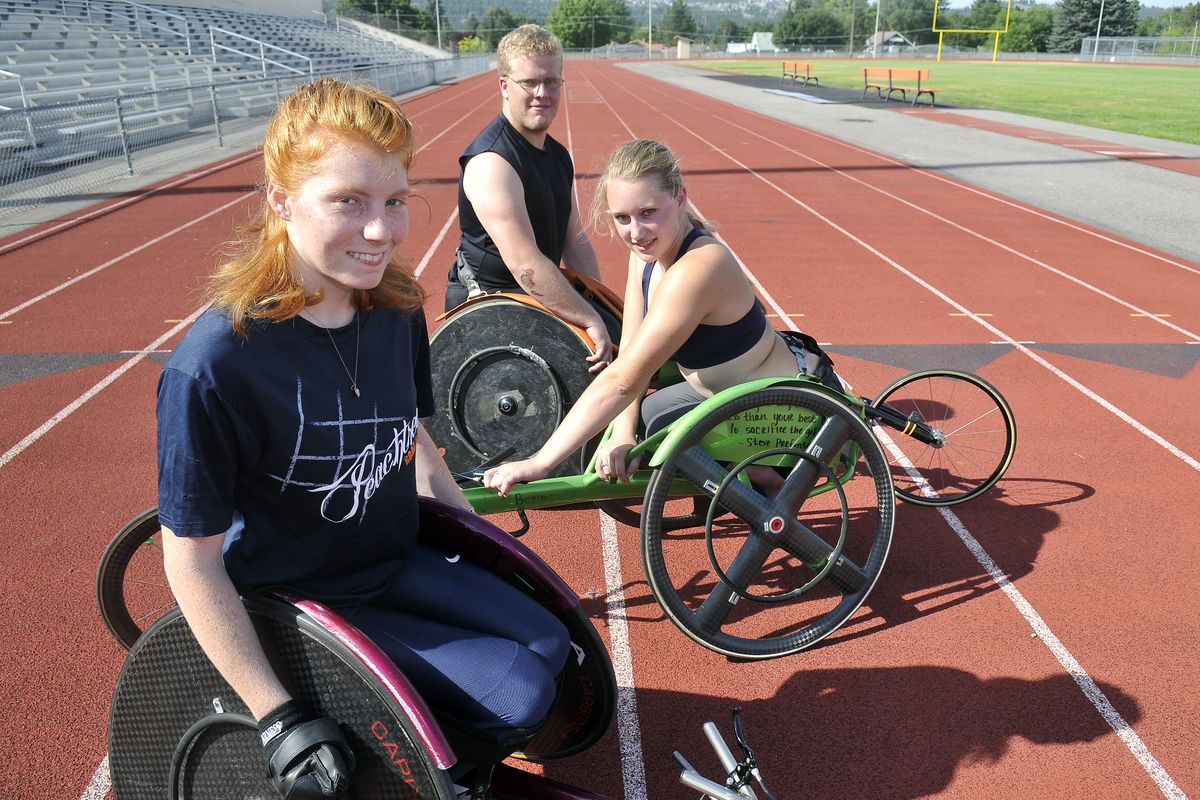4 members of Team St. Luke’s headed to London Games

The heat radiated from the track at West Valley High School one afternoon last week. Austin Pruitt, 17, zipped down the track, sunlight glinting off the wheels of his racing chair.
He and three other members of Team St. Luke’s are training hard. They’ve been selected to represent the U.S. as part of the Track and Field team in the London 2012 Paralympic Games.
Pruitt is fairly new to track, but he’s already made his mark. “I went to the World Championships in New Zealand in 2011 and came home with a bronze medal in the 200 meter.”
In London, he’ll compete in the 100 and 200 meter races.
Teammate Amberlynn Weber had urged him to join Team St. Luke’s. “She pestered me to come, but I didn’t start until eighth grade,” he said.
Team St. Luke’s Paralympic coordinator Teresa Skinner is used to reluctant athletes. When she started the program at St. Luke’s in 1998, she said, “The goal was to get kids and adults with physical disabilities active – and hopefully competitive.”
But her target audience greeted her ideas with skepticism. Many of them had never seen wheelchair athletics. “We say no to the unknown,” she said. “Try to get the shyest, able-bodied person to try something new.” She grinned. “I made a lot of annoying phone calls.”
Those phone calls paid off. “In 2008, I had the youngest athlete to make the team in Beijing,” she said. This year, Skinner has been selected as a member of the U.S. Paralympic coaching team.
Weber, 18, who pestered Pruitt into joining the team, will also be competing in London. At 7, she participated in the National Junior Disability Championships and was hooked on wheelchair athletics. “I loved the competition; I was good at it,” she said. “I came home with plaques and medals.”
She’ll be competing in the 100-, 400- and 800-meter events in London and has fixed her eyes on a medal. “Right now I’m in the top 10 in the world in each of those races.”
Going fast appeals to her. She recently clocked a personal best of 1 minute, 54 seconds in the 800 meter. “The wind rushing through my hair is my favorite feeling in the world,” she said.
Weber is thrilled to be representing the United States. “Having USA across your chest is unbelievable. Not very many people get the opportunity to compete at this level.”
Teammate Kristen Messer, 25, is also excited about making the Paralympic Track and Field team. “I started racing when I was about 15,” she said.
She recently moved to Spokane from Texas to train with Skinner as she prepared for the Paralympic trials. But Messer is no stranger to international competition. “I made the World Team in 2011 and went to New Zealand, and I made the Pan American team in 2011 and competed in Guadalajara.”
She won a gold medal at the Pan American Games after setting the world record for her classification in the 100-meter race. Her time? A swift 21.9 seconds.
Messer grinned. “I’ve always been very competitive. There’s a reason I have red hair.”
The fourth member of Team St. Luke’s on the Paralympic team wasn’t at the track last week. Susannah Scaroni was training at the University of Illinois at Urbana-Champaign, where she attends school.
Scaroni, 21, will be competing in the marathon – the final event of the 2012 London Games. In a phone interview she said, “I’ve always loved long distances.”
Yet the Tekoa, Wash., native hadn’t participated in a marathon until she went away to school. “It’s kind of an unwritten rule that everyone does the Chicago Marathon.” She laughed. “I really loved it and ended up qualifying for the Boston Marathon.”
She joined Team St. Luke’s when she was in fourth grade. “Teresa’s my second mother,” she said.
Scaroni is attending the University of Illinois on an athletic scholarship and Weber will be joining her there this fall.
While Skinner is proud of her athletes, she admits, “It turns into a painful experience when they leave.”
But their leaving is partly her fault. The London-bound athletes agreed that the self-confidence they’ve gained as members of Team St. Luke’s has been significant.
Scaroni said, “It’s helped me become independent and grown me as a person. Instead of seeing my disabilities, I focus on my abilities.”